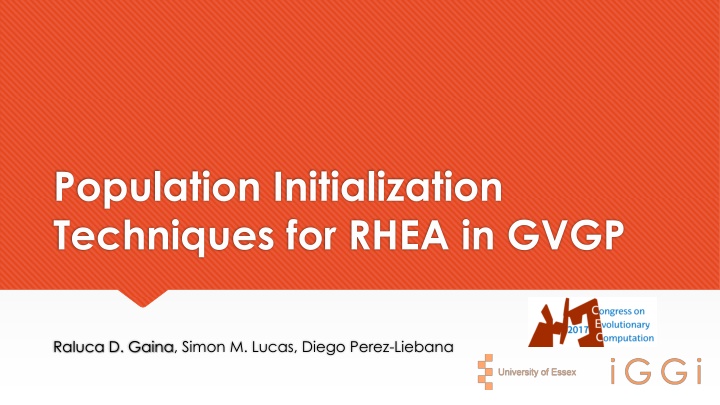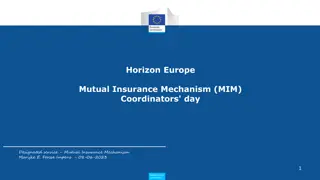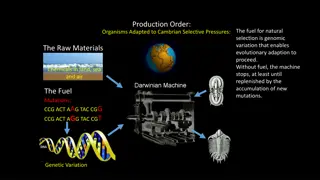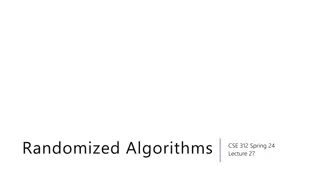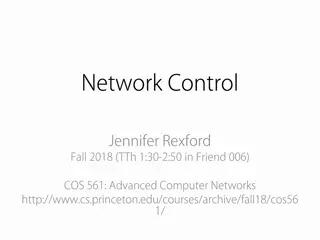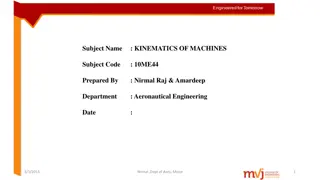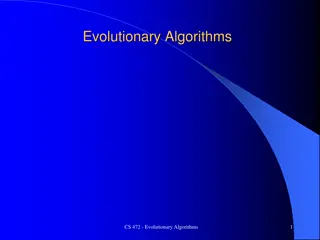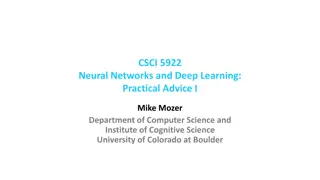Population Initialization Techniques for Rolling Horizon Evolutionary Algorithms in General Video Game Playing
Rolling Horizon Evolutionary Algorithms (RHEA) in General Video Game Playing (GVGP) show promise for faster evolution, but there is a lack of clear analysis in the existing literature. This study explores population initialization techniques for RHEA in GVGP, assessing methods like One Step Look Ahead (1SLA) and Monte Carlo Tree Search (MCTS-S) on 20 GVGAI games with different configurations. The experiment focuses on population size, individual length, and validation through comparison with MCTS.
Uploaded on Sep 22, 2024 | 2 Views
Download Presentation

Please find below an Image/Link to download the presentation.
The content on the website is provided AS IS for your information and personal use only. It may not be sold, licensed, or shared on other websites without obtaining consent from the author.If you encounter any issues during the download, it is possible that the publisher has removed the file from their server.
You are allowed to download the files provided on this website for personal or commercial use, subject to the condition that they are used lawfully. All files are the property of their respective owners.
The content on the website is provided AS IS for your information and personal use only. It may not be sold, licensed, or shared on other websites without obtaining consent from the author.
E N D
Presentation Transcript
Population Initialization Techniques for RHEA in GVGP Raluca D. Gaina, Simon M. Lucas, Diego Perez-Liebana
Introduction Rolling Horizon Evolutionary Algorithms (RHEA) show promise in General Video Game Playing (GVGP) as showcased in the General Video Game AI Competition (GVGAI). Better than random initialization for faster evolution? No clear general analysis in previous literature 2
Game AI Ms. Pacman Super Mario AI 3
General Video Game AI 4 any game !
General Video Game AI Competition 2D grid-physics games Arcade, puzzles, shooters, adventure. Ways to interact with the environment Ways to win Elements in a game Scoring systems Single and two player, cooperative and competitive. high-level view of current game state for agents; real-time decisions (40ms) 5
Rolling Horizon Evolution [0, N_ACTIONS -1] Population Crossover Next Population Mutation elitism Individual x0 Individual x0 Individual 0 Individual 0 Individual 0 Individual 0 + Individual 2 Individual 1 Individual 2 Evaluation Individual 2 Individual x1 Individual x0 Individual x0 Individual x0 Individual x0 FM Individual n Individual xn State 6 State value = fitness H
Methodology Try two methods One Step Look Ahead (1SLA) Monte Carlo Tree Search (MCTS-S) on 20 GVGAI games with different core parameter configurations. 7
Experiment Population size P - Individual length L = {1-6, 2-8, 5-10, 10-14, 15-16, 20-20} All other parameters fixed to default values Budget: 900 Forward Model calls L FM calls for 1SLA => one individual, mutate it to form population Half budget for MCTS-S MCTS-S rollout depth = L Validation Comparison with MCTS. 8
20 Games from GVGAI corpus 2 classifications by Mark Nelson and Bontrager et al. Balanced set: 10 stochastic, 10 deterministic, varying difficulty and game type. Survive Zombies Missile Command 9 Sea Quest Aliens
Results Overview Improvement much bigger when small pop size MCTS seeding significantly better 3 games in which MCTS seeding consistently bad: puzzles / long term reward Some games remain at 0% win rate Game Chopper: 26% => 100% win rate (1-6) Big improvement in low config shows promise of RHEA with improved evolution 10
Results Vanilla vs 1SLA 7 12 6 10 5 8 4 6 3 4 2 2 1 0 0 1-6 2-8 5-10 10-14 15-16 20-20 1-6 2-8 5-10 10-14 15-16 20-20 Vanilla 1SLA Vanilla B-1SLA Win rate, no. games significantly better Overall: 8, 6 Score, no. games significantly better Overall: 11, 8 11
Results Vanilla vs MCTS-S 12 18 16 10 14 8 12 10 6 8 4 6 4 2 2 0 0 1-6 2-8 5-10 10-14 15-16 20-20 1-6 2-8 5-10 10-14 15-16 20-20 Vanilla MCTS-S Vanilla MCTS-S Win rate, no. games significantly better Overall: 4, 12 Score, no. games significantly better Overall: 5, 16 12
Results 1SLA vs MCTS-S 9 14 8 12 7 10 6 8 5 4 6 3 4 2 2 1 0 0 1-6 2-8 5-10 10-14 15-16 20-20 1-6 2-8 5-10 10-14 15-16 20-20 1SLA MCTS-S 1SLA MCTS-S Win rate, no. games significantly better Overall: 3, 10 Score, no. games significantly better Overall: 5, 13 13
Results - MCTS Validation 16 14 12 10 8 6 4 2 0 1-6 2-8 5-10 10-14 15-16 20-20 Win Rate Score No. games MCTS-S better than Vanilla, but not MCTS Overall: 10, 15 14
Summary Analysis of One Step Look Ahead (1SLA) and Monte Carlo Tree Search (MCTS-S) seeding for vanilla Rolling Horizon Evolutionary Algorithm (RHEA) Multiple RHEA parameter configurations Win rate and score measured on 20 GVGAI games Overall and pairwise comparison Validation against MCTS 15
Conclusions Seeding improves performance if population size is small MCTS seeding significantly better (performance drops if rollout depth too large) MCTS seeding worse in puzzle games / longer lookaheads Limited exploration, search too narrow MCTS seeding not worse than simply MCTS 16
Future Work Meta-heuristic: which seeding method is best? Better exploration of search space & use of solution provided by seeding Better evolution paired with powerful seeding method More games to better judge significance Questions? Questions? 17
